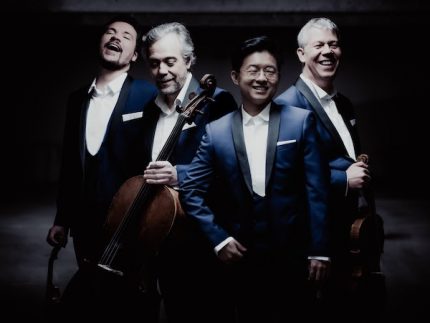After pandemic delay, Quatuor Diotima finally arrives at UC with compelling Bartók and Beethoven

The past two years for Quatuor Diotima could serve as a microcosm of the impact of the pandemic on traveling international musicians.
The Paris-based quartet was to make its debut in the fall of 2020 as the University of Chicago’s Randel ensemble in residence. Their ambitious lineup of programs for the 2020-21 season included the complete Bartók quartets and a survey of the late Beethoven quartets.
All of those concerts were cancelled due to Covid, as was their rescheduled appearance last fall. On Friday night the Quatuor Diotima finally made its local debut in the UChicago Presents series at Mandel Hall.
In addition to the repeated cancellations, the string quartet also had a change of personnel in the interim with Leo Marillier replacing Constance Ronzatti as second violinist just last month.
The first half of the program was devoted to Bartók, with two of his quartets giving the UC audience a taste of the full cycle that fell victim to the pandemic.
Bartók wrote his String Quartet No. 3 nearly a century ago (1927) and this tough, uncompromising score still has the power to knock listeners sideways. Cast in a single 15-minute movement, it is the shortest and most forward-looking of Bartók’s six quartets and, indeed, of his entire oeuvre. The Third Quartet is a virtual compendium of extreme string effects with highly chromatic sections, rapid changes of meter, col legno bow tapping and artificial harmonics among other technical landmines.
Hearing Quatuor Diotima live, finally, in the Third Quartet one was struck by their corporate sound. As led by the group’s gifted first violinist Yun-Peng Zhao, the quartet presents a rich, febrile sonority yet one that is unified and finely blended. New violinist Marillier seamlessly fit in with his three colleagues as if he has been playing with them for years.
The quartet’s performance of this intensely difficult score was unerringly polished and committed, all the technical hurdles handled fluently and with precision. Yet in this, the most heavy-metal quartet of the first half of the 20th century, the voltage level was two notches below where it needed to be. This score demands to be played with unbridled intensity and fury, as with the classic account by the young Emerson Quartet (who, ironically, were playing their farewell Chicago concert the same night). On this occasion Quatuor Diotioma’s performance was far too cautious and laid back for such atom-blasting music.
The musicians proved more in synch with the expansive canvas of Bartók’s Fifth Quartet, written in 1934. The arch-like structure spans five movements running a half-hour, with a central scherzo surrounded by two slow movements and two fast sections framing the entire edifice.
As in the Third, a restless tension predominates and the players brought gripping intensity to the driving outer movements. Yet they also reveled in the contrasts, bestowing a spare, searching quality to Bartók’s fleeting pages of fragmented lyricism, as with the uneasy calm of the Adagio molto.
The earthy weirdness of the Bulgarian-inspired Scherzo was vividly characterized—with a notably witty coda—and the hard-charging finale provided the requisite payoff with insouciant throwaway tunes and ditzy minuet en route in an exhilarating race to the coda.
Beethoven’s Quartet in A minor was his penultimate work in the genre and concluded the UC Presents program (as it did for the Emersons at DePaul).
Beethoven’s late quartets pose daunting challenges to even the most esteemed ensembles. Yet Quatour Diotima delivered their finest performance of the evening here, displaying skill, technical acumen and a focused expressive depth that did justice to this remarkable cornerstone work.
The confiding, finely textured slow introduction and ensuing Allegro drew us immediately into Beethoven’s world. Yet while the musicians resisted the impulse to overdrive this movement, there was at times a segmented, even choppy quality to the ebb and flow for all the strength and polish of the playing. The ensuing dance-like movement went better with the drone trio section rendered with charming delicacy.
The heart of Op. 132 is the extraordinary middle movement, which Beethoven titled “a hymn of thanksgiving” after his recovery from serious illness. The Diotima players had the full measure of this elevated music, playing with a pure tone and concentrated expression that movingly conveyed the spiritual solace and transcendence. Contrasting sections were enfolded seamlessly while sustaining the overall benedictory glow.
The brief fourth movement brought us back down to earth in a playfully dispatched account. The virtuosic Allegro appasionato finale provided all due confidence, affirmation and musical bravura, enough to fortify oneself to head out again into a troubled world.
Quatour Diotima performs 3 p.m. April 10 as part of UChicago’s “Korngold Rediscovered” festival. The program will include Korngold’s String Quartet No. 3, Zemlinsky’s String Quartet No. 1 and Brahms’ String Quartet No. 2. korngoldfestival.org
Posted in Performances





